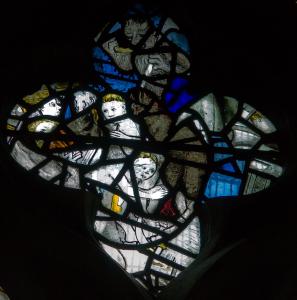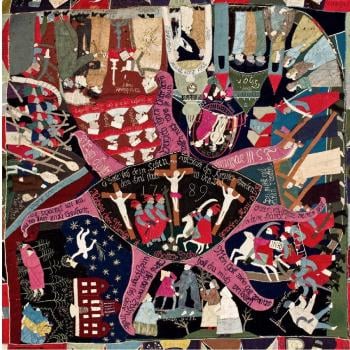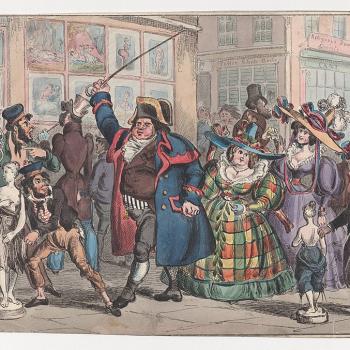
Paul, in the book of Romans, gives one of the great foundations for the Christian understanding of the conscience. He suggests that everyone has been given a conscience and that they will be judged on the basis by which they follow its promptings in their lives:
When Gentiles who have not the law do by nature what the law requires, they are a law to themselves, even though they do not have the law. They show that what the law requires is written on their hearts, while their conscience also bears witness and their conflicting thoughts accuse or perhaps excuse them on that day when, according to my gospel, God judges the secrets of men by Christ Jesus (Rom. 2:14-16 RSV).
Everyone has a conscience. Everyone has a sense of morality within them. Not everyone has it as well developed as everyone else, because, like with many innate things, to develop it, it must be actively engaged to reach its full potential. That potential will differ from person to person due to the circumstances of their lives. Some will have aids, such as the Law of Moses, or other forms of revelation, which will help direct the conscience; others will mostly have to rely upon empirical experience examined by the light of reason. Whatever the person knows, or think they know, will be used by the conscience. It will try to reason out what potential good or evil we could do, telling us, of course, to avoid the evil while giving us room to choose from a selection of possible goods. Because of this, different people will be led by their conscience to do different things, sometimes in contradiction from each other. Everyone is expected to follow their conscience, and not the conclusions of others, though they should listen to others and learn from them, for their wisdom can be one of many sources their conscience can and should consider when making its own decisions.
Everyone will be judged based upon what they know and understand, and how they relate to the way their conscience directs them to act based upon that knowledge. This is why there will be more expectations out of those with greater knowledge than those who have less, for they will have more for their conscience to consider and use to make their decisions. This also means that those who do not have knowledge of particular laws or precepts, or do not understand what they mean and how they apply, so long as their ignorance is not willful, are not bound by such laws or precepts (just as the Gentiles were not bound by the Law of Moses):
For that reason, no one is bound by some precept except by the medium of knowledge of that precept. And therefore, he does not have the capacity to notice the precept is not bound; nor is someone ignorant of the precept of God bound to carry out that precept, except insofar as he is held to know the precept. But if he were not held to know, nor knew, in no mode would he be bound by the precept. [1]
Thus, it is important to understand how the conscience works. It points us forward, to seek after and pursue the greater good which it knows and understands. If we resist that direction, indeed, if we do something which it tells us is evil, then, even if it is objectively in error and it really is a good, since we resist the conscience, it is clear our intention is to embrace something which we think is evil and we will be held culpable for choosing to do some evil instead of doing what we believe is good. On the other hand, if we believe incorrectly, and not out of willful ignorance, that some objective is good, when it is not, because we embrace what we believe is good, we are seen to embrace and seek after the good, and as such, will not be held culpable for choosing evil:
Someone that has an invincibly erroneous conscience, not only does not sin by acting according to it, but even that he is held to follow it at any time. The reasoning of each is that he does not sin, because although the action may not be right in itself, nevertheless, it is right according to the conscience of the one who does the act; at anytime one is held to act according to it, if his conscience, which is the proximate rule, so suggests it must be done. [2]
The conscience, to be sure, should be exercised and developed. This means we should strive to seek after wisdom and knowledge to help inform it, but also, we should develop ourselves so that we find it easier and easier to follow its prompting and not resist it. We will not know everything, and often, we will not know where to find what we need to know, or how to interpret what can be and is given to us to follow, but the conscience will do the best it can with what it has been given and we must not ignore its prompting. The more we know, the better our conscience will be able to engage the situation and direct us, but that does not mean there will not be some error in its reasoning. It is a tool with limits, and it can be mistaken. Nonetheless, even if it is shown to be objectively wrong in a particular case, it still can be shown to be pointing us in the right direction, that is, to seek after and pursue the greater good, and not become so attached to limited goods. That is why, even when it is mistaken, following it helps us become better. Similarly, the better we become, the more refined the conscience will be, and so it will end up being able to make better and better decisions, meaning, even if it is mistaken at first, it will allow itself to take in new facts to make new decisions, and so by use of moral triangulation, it will eventually be able to point us in the right direction.
This is why, once again, it must be said that if we ignore our conscience, if we resist it and its prompting, we turn away from the greater good, so that eventually, our triangulation will turn us away from the holistic good and instead pursue some private good at the expense of the greater good. Similarly, if we resist its growth, or its pursuit for greater insight, out of fear we will have to change our ways, then our ignorance might be culpable ignorance, and as such, our conscience is impeded and we end up sinning by making that impediment for ourselves. Even if we do not know any particular revelation about what we should or should not do, we still have a moral compass, and it is one which we follow and develop, using the resources that we have. Atheists just as much as theists possess it, and indeed, it seems many of them actually engage it better than theists because they do not try to use theological reflection as a way to damper their conscience. What is important is the conscience, and how it deals with what it knows. “For God shows no partiality. All who have sinned without the law will also perish without the law, and all who have sinned under the law will be judged by the law” (Rom. 2:11-12 RSV).
We must not, of course, take this to mean, it is better not to know the law (in any form) and to remain in ignorance. For once again, we should be developing our conscience, and as such, developing ourselves, working out the best way we can to achieve the holistic good. We should seek to be informed the best we can so as to help the conscience do its work. If we try to remain ignorant, thinking that will, in the end, save us from being culpable for what we do, because we do this, our ignorance will be willful and we will be culpable for that which we could readily have known if we didn’t resist it. Similarly, our conscience itself will prompt us to know and understand more, so that, if we do not do so, we are resisting it and so can be shown to already reject the holistic good. Similarly, the teaching of the law (religious or natural) is meant to help us, to make us and our life better. It is meant to help us come to learn about and apprehend the objective, absolute good. The more we know that good, the better we can make things in the world. The less we know it, though we might not be culpable for what we do, nonetheless, we (and those around us) will suffer the consequences of bad acts done in ignorance. Thus, it is important to seek after it, so that we can help people, including ourselves, away from needless suffering.
Our conscience is meant to help us ultimately unite our personal, subjective engagement with the good with the objective good. Revelation, wisdom from others beyond ourselves, can and should help in that objective, though it must also be acknowledged, our understanding of what we are told and how it applies to us in our own situation is not always easy to discern. For the Christian, the best way to approach the conscience, the best way to direct it, is to have it reflect what it knows from all sources of knowledge and then ask what would Jesus do:
And the best criterion of conscience is always closet art hand; it is this: Before making any important decision, whether of personal or social importance, call up the image of Jesus Christ in mind, let it have free play in the soul, and ask, Would he do this? In other words, Will he approve of this action or not? Will he bless me for it or not? [3]
Jesus is the ultimate revelation of God to us. As such, Christians should engage him first and foremost before all other revelation, before all other secondary wisdom, including the secondary wisdom of the saints. And as he shows us that God is love, the conscience should therefore be directed to engage the world primarily in and through love. Knowing facts, of course, will help, but if we do not put Jesus and his way at the forefront, if we do not use love as the hermeneutic to understand the law (revealed law or natural law), we will stunt the growth of our conscience. Jesus comes us to us, like he did with Peter and Andrew, asking us to follow him, and to follow him is to engage the path of love. The more we engage love, the more our conscience will develop properly, allowing it to do what it should do, direct us to what is good and true. Our conscience, therefore, should not only direct us in and through the use of reason, but reason as it is understood and seen in the light of love. For God is the absolute good, and God is love. If we want the absolute good, we will pursue love. Indeed, we will find our love will direct us and inspire us in a way which reason alone cannot, for love can direct us to act in ways which transcend reason, for reason only guides based upon what it knows and understands while love allows mystery and transcendence to shape and direct it. Thus, the good which we should seek, the good which we want, cannot be found without love, while it can be and will be found without extensive study and knowledge of facts and theories. Of course, the more we attain it, the more our knowledge should develop, and that is a result which we should not reject, but neither should we, like the so-called Gnostics, make it alone all that is important. Love is at the heart of revelation. Love alone is credible. The more we love, the more we will know that which we love, and so the more we will be able to love it. But love doesn’t require absolute knowledge. All it requires is a will to love, and thus, the conscience, when guided by love, will be able to point us to the greater good in a way which reason alone cannot and will not be able to do.
[1] St. Alphonsus Liguori, Moral Theology. Volume I: Books I – III On Conscience, Law, Sin and Virtue. Trans. Ryan Grant (Post Falls, ID: Mediatrix Press, 2017), 113.
[2] St. Alphonsus Liguori, Moral Theology. Volume I: Books I – III On Conscience, Law, Sin and Virtue, 26.
[3] Vladimir Solovyey, God, Man & The Church. The Spiritual Foundations Of Life. Trans. Donald Attwater (Cambridge: James Clarke & Co., 2016), 120.
Stay in touch! Like A Little Bit of Nothing on Facebook.
If you liked what you read, please consider sharing it with your friends and family!
N.B.: While I read comments to moderate them, I rarely respond to them. If I don’t respond to your comment directly, don’t assume I am unthankful for it. I appreciate it. But I want readers to feel free to ask questions, and hopefully, dialogue with each other. I have shared what I wanted to say, though some responses will get a brief reply by me, or, if I find it interesting and something I can engage fully, as the foundation for another post. I have had many posts inspired or improved upon thanks to my readers.













